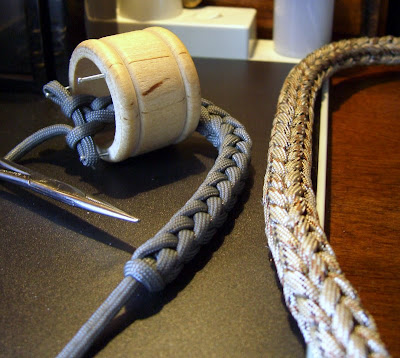 Just using two of the three nails on the spool knitter, produces a smaller square shaped and flexible paracord braid, compared to the larger round one made by using 3 nails.
Just using two of the three nails on the spool knitter, produces a smaller square shaped and flexible paracord braid, compared to the larger round one made by using 3 nails. This is the same result one would get using a lucet.
This is the same result one would get using a lucet.When finished with the braid for a lanyard, I usually make a small loop and finish with a lanyard knot and loop on each end.
A shorter length can be used as a simple fob for use with a knife, flashlight, multitool, key ring, key chain, etc...
Hello,
ReplyDeleteI just discovered your site. This information is great! I will definitely be trying to emulate some of the things you've done for lanyards and sheaths on the knives I make.
Thanks,
Stephen Renico
What great stuff! Can we do a feature on your blog, and possibly promote your stuff? Let me know by emailing me djj at iyamagoo.com
ReplyDeleteI found you after you dropped by our page and showed up on MyBlogLog!
this is neat stuff! i'll probably drop by again to browse through your archives.
ReplyDeletecame here through MyBlogLog as well. and thanks for dropping by my site.
What type of braid did you use in this video to make the quick release portion?
ReplyDeleteI used a section of paracord made on a three peg spool for the section unraveled on the video. Anything made on the knitting spools are just versions of a chain sinnet, so they will unravel when pulled like that. The cord is run thru the loops on the pegs when you're done with making a length and that keeps it from coming undone.
ReplyDeleteI'm having a hard time figuring
ReplyDeleteout how to make the sinnets shown
in this post- can you tell me which
these are called in Ashley's book
of Knots? My best guess is you're
doing #2890 and #2891, or perhaps
the two-peg version you made is #2878?
Any tips or pointers to instructions
would be much appreciated, and thanks
for the great blog!
When I first tried these, I didn't know they were in ABoK, I think they'd be #2878 and #2880, done on spools(results of the fork and two peg spool are the same square shaped sinnet). The others in the book look so similar, it can be hard to tell them apart.
ReplyDeleteI have a short YouTube video showing the start of using a three peg with paracord. The video is a bit dark, and I may try to post one with better lighting...
After seeing your initial spool post I started experimenting and decided on this pattern for a nice compact braid that's easy enough to re-do that i don't mind undoing it frequently when needed.
ReplyDeleteI carry 4 arm lengths of paracord in this configuration in the bottom of my daily stuff bag. I also made an alternative to your spool that is just a thick piece of copper wire (12ga.?) bent into a U shape for quick re-knitting of the cord when I have downtime. It's flat and can float around in the same bag without taking up much space.
i have been searching a while on your 2 peg spool knit for more info like how to knit with just 2 pegs or 3 for that matter lol
ReplyDeleteany help would be appreciated
i thoroughly enjoy your blogs on knots and tying and just want to try some lanyards next,,
thanx again
patrick
patrik3536@yahoo.com
There are many videos on YouTube showing how to start with spool knitting, including the short one I did, and the process is the same no matter if it's 2 pegs or 20. ;)
ReplyDelete
ReplyDeleteHi Stormdrane,
I like the way you finish the cord with the lanyard knot and the loop, but am not sure how you make it look like two strands are coming out of the braid instead of one, or so seems in the photo. I can make a loop with one strand and make a lanyard knot, then work the slack to make the loop small enough, but how do I bring the end back to the braid in a neat way?
I usually finish my lanyards with a simple overhand knot in the end of the strand and using it to keep the strand from coming out totally, thus making a loop, but never has liked the way that knot looks at the side of the braid, and your way looks way better.
@rickthenailer, After tying the length of knitted lanyard, I make the lanyard knot/loops on each end, then use hemostats to tuck/pull the very end strand back into and along side the other strand coming out of the lanyard, and trim it to finish.
ReplyDelete